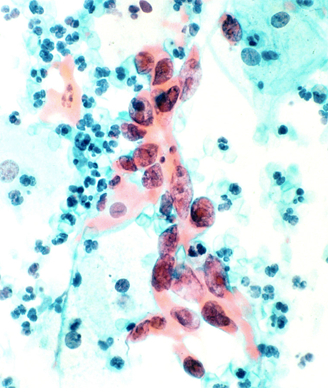Many Women Willing to Extend Cervical Cancer Screening Intervals
Women in routine gynecologic care expressed willingness to extend screening intervals and use cytology alone or Pap-HPV cotesting if recommended by a physician.
Cytological specimen showing cervical cancer

Women in routine gynecologic care expressed willingness to extend intervals between screening to a certain extent, and to use cytology alone or Pap-Human Papillomavirus (HPV) cotesting if recommended by a physician, according to a new survey.
In 2012 several professional organizations including the American Cancer Society, the American Society for Colposcopy and Cervical Cytology, and the American Society for Clinical Pathology changed their recommendations against annual screening. The US Preventive Services Task Force considered both cytology alone at 3-year intervals and HPV cotesting with cytology at 5-year intervals to be acceptable strategies for women between the ages of 30 and 65.
“HPV cotesting with a 3-year screening interval has been an acceptable option since 2003, yet uptake of cotesting in clinical practice has been slow,” wrote researchers led by Patti E. Gravitt, PhD, MS, of the University of New Mexico in Albuquerque. She and colleagues conducted a survey of 551 women aged 36 to 62 who were enrolled in the Human Papillomavirus in Perimenopause Study to assess attitudes toward new cervical cancer screening options. Results were published in the February issue of Obstetrics & Gynecology.
Most of the women (55.6%) were aware that screening recommendations had recently changed, though 74.1% believed that women should still be screened annually. If it came with a recommendation from their physician, 68.4% of women would accept extending that interval to every 3 years; only 25.2% would extent to 5 years, however.
Participants were also asked about screening test preference, and 60.7% said they preferred Pap tests only. Another 31.5% did not have a preference and were willing to be screened by Pap or HPV testing, and 7.8% preferred HPV testing alone. Many women (41.4%) said they would experience either moderate or severe anxiety if screened with an HPV test alone.
“A desire for more frequent care, higher anxiety, and higher perceived risk were all associated with being less willing to accept alternatives to annual Pap tests,” the researchers wrote. They noted that the study is limited by its non-representative population: these participants are older, of higher socioeconomic status, and are in routine screening.
In an accompanying editorial, George F. Sawaya, MD, and Miriam Kuppermann, PhD, both of the University of California, San Francisco, wrote that the fact that women would change practices if recommended shows the importance of providers in implementing evidence-based guidelines. “Additional discussion is warranted to define the appropriate role of patient preferences in screening decisions, specifically regarding screening interval,” they wrote.